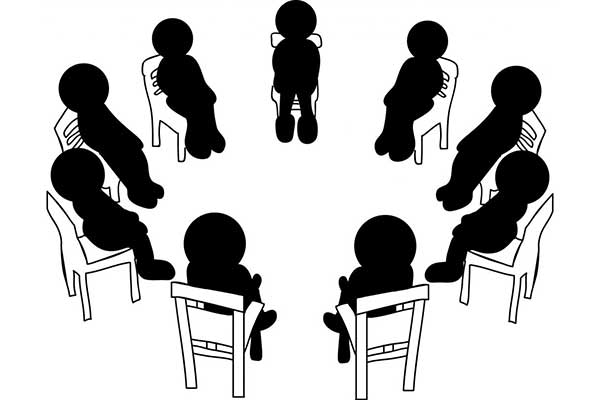Alcoholics Anonymous is one of the most important spiritual movements of our time. Many Christians speak admirably of AA since it’s changed millions of lives, but they have a lot of disdain for the concept of being “spiritual but not religious,” which actually originated in the AA community rather than the hippie dippie new age world. AA is a puzzle to an evangelical like me because it combines rigorous discipleship with explicit theological pluralism. According to the talking points of evangelicalism, something like AA is not supposed to work as well as it does. But in many ways, I would argue that what AA calls “recovery” is what Christian salvation was supposed to be about all along. So I wanted to share seven insights AA has given me about salvation.
1. Everywhere is hell without serenity
In John Milton’s Paradise Lost, Satan says, “Which way I fly is hell; myself am hell.” This makes sense to an alcoholic. The best party in the most luxurious circumstances with the most beautiful, interesting people is hell to an actively drinking alcoholic. It doesn’t matter whether the sand is perfectly white, the water is perfectly blue, and the jungle mountains around you are perfectly gorgeous. Sometimes it’s because the alcoholic is causing social chaos and ruining other peoples’ lives. Other times, the hell is private and internal. An alcoholic doesn’t need to be punished to experience hell. Hell is simply the endless wrath of living in the prison of your resentment, fear, and guilt, and all the explosions that they cause.
Sadly, abstention from alcohol without a transformation of character can actually become more torturous than the numbness of getting drunk as an escape. Some of the most toxic, miserable people in the world are what we call “dry drunks.” I often wonder how many fundamentalist Christians are abstaining alcoholics and addicts who have clung to religious doctrine instead of going through the healing process of the twelve steps.
The goal of alcoholic recovery is to attain a state of serenity, in which you are at ease with the people around you and the circumstances of your life. AA teaches that the way to serenity is to submit yourself to God’s will through a program of methodical repentance. Serenity is what heaven looks like to a recovering alcoholic. It is what John Wesley would call “Christian perfection,” a state of being in which our hearts’ idols, addictions, and anxieties have been replaced by love. When I have serenity in my heart, I’m living in heaven whatever my material circumstances.
2. Grace and truth require each other
AA advertises itself as a program of “rigorous honesty.” It’s not a place for cheap grace, because to an alcoholic, cheap grace is actually deadly. Blanket, blithe reassurances that you’re perfectly fine the way you are don’t work for alcoholics. Enablers who try to ignore or hide our sin are not our friends. We need both grace and truth to make progress in recovery. It is only in the context of grace that facing the truth becomes bearable. In this way, AA is the exact opposite of a fundamentalist Christian church.
Because the fundamentalist experience is built around the intimidation of a ruthless fire and brimstone God, it’s very hard for fundamentalists to open up with one another about their flaws. In contrast, AA starts with unconditional acceptance as a foundation for pursuing integrity. When a drunk comes back after relapsing for the tenth time in a year, the only response is “We’re glad you’re here.” It’s because of that unconditional acceptance that steps can be taken toward rigorous honesty. Truthfulness is modeled in AA meetings, where alcoholics practice speaking with integrity about their life problems and solutions. One of the coolest things about this process is to hear people gain insight and shift their thinking through the course of the testimony they share. Often, we go to a meeting filled with angst and confusion and leave with a tremendous sense of freedom and peace after having held our confusion up to the light of truth.
3. Perfect freedom is perfect surrender to God’s will
This is the strange paradox at the heart of AA. It is actually liberating to surrender to God. I realize that sounds like something a fundamentalist would say. But surrendering to God is nothing like obeying an abusive patriarchal narcissist. Surrendering to God is more like the moment when you finally start dancing after an infectiously rhythmical song won’t let you stand still any longer. As long as we are stuck in self-will, we are like the kids at the sixth grade dance who stand terrified against the walls with our arms folded. One thing that AA is very matter of fact about is that God will give us direct guidance in our lives if we practice improving our “conscious contact” with him. God’s will is not the weaponized, inerrant book of rules that fundamentalists lug around, but the core joy in the universe that is constantly inviting us to dance.
4. We cannot find God without a community
AA expects that its members will have direct encounters with God. The twelve steps depend upon God’s direct intervention in our lives. Though we have certain books that we use for guidance, the most important resource for discerning what God is saying to us is our community. God often speaks through what people share in our meetings. He also speaks through our sponsors. The sponsoring relationship is probably the most important structural aspect of AA. It creates the equivalent of apostolic succession. Every AA member can ultimately be traced back through sponsorship to the founder Bill Wilson. What every sponsor shares with his/her sponsee is shaped by a living tradition that has been passed down through multiple generations of sponsors. In this sense, AA is not that different than Christianity. The Bible is simply a collection of personal testimony about God that the Christian apostolic tradition considered trustworthy enough to grant it special status. The AA Big Book is similarly the trustworthy testimony of AA tradition. But it’s the testimony of our community in both its canonized and ongoing forms that guides our pursuit of God’s will.
5. Certainty and control are the opposite of serenity
Addiction is motivated by the need to control your environment. It’s of course delusional because getting drunk or high causes you to lose control of yourself. But a critical part of gaining sobriety and serenity is becoming comfortable with a lack of control and certainty. In this sense, the pursuit of serenity is the opposite of the certainty and control that are promised by fundamentalist Christianity. We cannot know or control the future. We do not have all the answers. At every AA meeting, we pray the serenity prayer, asking for the serenity to accept the things we cannot change, the courage to change the things we can, and the wisdom to know the difference. Acceptance means relinquishing our attempts to control the people in our lives and learning how to love them as they are, which is actually the best hope we have of helping them gain their own spiritual transformation. It means backing away from trying to argue other people into submitting to our ideologies. It means wanting other people to find what works for their pursuit of serenity.
6. Head knowledge is only useful insofar as it supports a change of heart
AA is filled with corny maxims like “Fake it till you make it” and “One day at a time.” These maxims can be very useful means of taming our hyper-agitated minds. But within AA, there is a recognition that a change of heart is what matters and a pragmatism that seeks whatever works to foster that spiritual transformation. Mature recovering alcoholics are not going to argue about doctrine both because of the high value placed on accepting others’ differences and because nobody wants to be the stumbling block that pushes another alcoholic out of the program and back into drinking. It makes sense that a pragmatic, heart-focused spiritual movement would refer to God as the “God of our understanding” or our “higher power.” Though AA doctrine thus takes the form of “whatever works for you,” this is nothing like flimsy hippie dippie spirituality, because alcoholics are forced by their condition to seek God desperately. The God that they “find” is simply a personal vocabulary for talking about the objective God who has always been there that is authentic to their journey.
7. Salvation is one path with many variations
AA is heavily influenced by Christian thinking about sin, grace, and repentance. Salvation cannot happen without “turning our will and our lives over to the care of God as we understand him.” It requires the recognition that we are helplessly imprisoned by our sin without God’s help (steps 1-2). It requires spiritual rebirth (step 3). It requires facing the truth about ourselves and renouncing self-justification or blame (steps 4-5). It requires handing over all our idols and spiritual defects to God (steps 6-7). It requires the pursuit of reconciliation and restorative justice as part of our spiritual healing process (steps 8-9). It requires practicing daily discipleship, spiritual devotion, and fellowship (steps 10-12). In other words, AA’s understanding of salvation is basically a spiritually neutral articulation of the justification and sanctification that is the core of Wesleyan Christianity.
I happen to believe that the Christian story offers me the best possible narrative framework for achieving the justification and sanctification that AA promotes. I cannot imagine my salvation journey outside of being crucified and resurrected with Jesus. But I have learned a lot from prayerful agnostics and heterodox God-seekers. And it wouldn’t bother me to hear Buddhists or Muslims map the twelve steps onto the terminology of their faith traditions. The serenity that I call “union with Christ” has other names to people who use different words, and I don’t think I need to correct them if doing so is only for the sake of proving my orthodoxy to other Christians.
Check out my book How Jesus Saves the World From Us: 12 Antidotes to Toxic Christianity!
Subscribe to our podcast Crackers and Grape Juice!
Support our campus ministry NOLA Wesley by becoming a monthly patron or one-time donor!

















